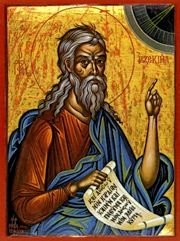Breaking the Bread (Sept. 10)
Prepare yourself for Mass this weekend!... read the Mass readings
( http://www.usccb.org/nab/091006.shtml )
and then read this reflection (by Scott Hahn's St. Paul Center for Biblical Theology):
Breaking the Bread: Biblical Reflection on the Sunday Mass Readings
September 10, 23rd Sunday in Ordinary Time
(Isaiah 35:4-7 Psalm 146:7-10 James 2:1-5 Mark 7:31-37)
The incident in today's Gospel is recorded only by Mark. The key line is what the crowd says at the end: "He has done all things well." In the Greek, this echoes the creation story, recalling that God saw the things he had done and declared them good (see Genesis 1:31).
Mark also deliberately evokes Isaiah's promise, which we hear in today's First Reading--that God will make the deaf hear and the mute speak. He even uses a Greek word to describe the man's condition (mogilalon = "speech impediment") that's only found in one other place in the Bible--in the Greek translation of today's Isaiah passage, where the prophet describes the "dumb" singing.
The crowd recognizes that Jesus is doing what the prophet had foretold. But Mark wants us to see someting far greater--that, to use the words from today's First Reading: "Here is your God."
Notice how personal and physical the drama is in the Gospel. Our focus is drawn to a hand, a finger, ears, a tongue, spitting. In Jesus, Mark shows us, God has truly come in the flesh.
What he has done is to make all things new, a new creation (see Revelation 21:1-5).
As Isaiah promised, He has made the living waters of baptism flow in the desert of the world. He has set captives free from their sins, as we sing in today's Psalm. He has come that rich and poor might dine together in the Eucharistic feast, as James tells us in today's Epistle.
He has done for each of us what He did for that deaf mute. He has opened our ears to hear the Word of God, and loosed our tongues that we might sing praises to Him.
Let us then, in the Eucharist, again give thanks to our glorious Lord Jesus Christ. Let us say with Isaiah, Here is our God, He comes to save us. Let us be rich in faith, that we might inherit the kingdom promised to those who love Him.
copyright St. Paul Center for Biblical Theology www.salvationhistory.com
Labels: Sacred Scripture


<< Home